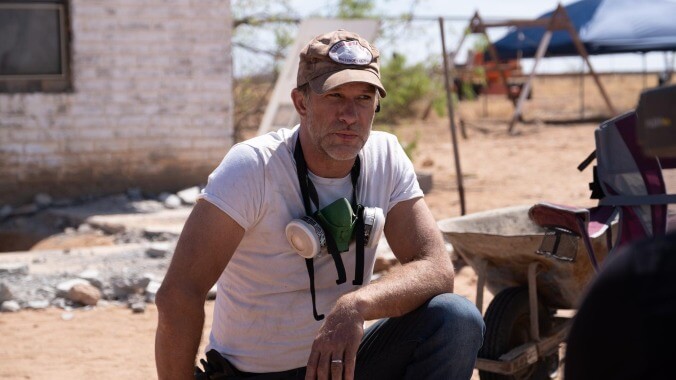In Dig, Thomas Jane and Emile Hirsch need to uncover a better script
Maybe the most notable thing about this would-be thriller is Hirsch's cartoonish hillbilly accent

If the goal of Dig is to make us feel any kind of sympathy for Scott Brennan (Thomas Jane), the kind of caricatured country dad who’d go looking for his out-past-curfew daughter in a desert honky-tonk while wielding a giant mallet, it gets off to an unconvincing start. After hauling his daughter (Jane’s real-life daughter Harlow, playing a character named, what else, Jane) over his shoulders in a fireman’s carry, he proceeds to the nearest gas station and starts a fight with an armed trucker who shoots his wife dead during a skirmish. Stupid and irresponsible to a deadly degree aren’t the most endearing qualities in a movie protagonist.
Scott has a weirdly specific job, as a salvager who goes into old homes and strips them of their fixtures. Naturally, he gets an equally weirdly specific request from a customer named Victor (Emile Hirsch), who wants to pay in stacks of cash, and requests he get the job done extra-quickly. Scott is at least smart enough to see the red flags, but the gas-station incident left Jane traumatized and mostly deaf, in need of a cochlear implant costing $30,000. He was supposed to take a week to go on a fishing trip with Jane, who for obvious reasons pretty much hates him. But after instead dragging her along for some hard, dubious labor, his candidacy as dad of the year is clearly in question.
Hirsch’s hillbilly accent is so cartoonish that when he later shows up at the salvage site wearing a ski mask, it’s absurd to imagine Victor’s hiding his identity in any way. Mercifully, the movie eventually acknowledges this. Along with his crazy girlfriend Lola (Liana Liberato), he holds Scott and Jane at gunpoint, telling them the real job is to retrieve what’s buried deep under the porch. Because Victor and Lola are clearly awful people, the likelihood they’ll let daddy and daughter out alive seems slim. So it’s up to Scott, who’s already been established as a reckless fool, to outsmart his even stupider armed captor.
The entire production feels like one of convenience, in which a desert parcel of land with a run-down house on it happened to be available, and a script got written to take advantage of that fact. Unfortunately, the movie never does anything interesting with the actual house; the action mostly takes place around the hole Scott and Jane dig outside. Every so often they try to escape and find there’s nowhere to go. It’s tough to build dramatic tension with a story that feels like it’s spinning its wheels until the titular excavation finally uncovers something.
Since Scott isn’t especially likable beyond Thomas Jane’s ability to make him seem hapless, Dig depends upon sympathy for daughter Jane, in an uncomfortably cliched fashion. With bleached-blonde hair and a clean-cut, all-American innocent cheerleader look amid the dirt-covered desert folk, Jane fits the archetypal hostage daughter mold exemplified by Elisha Cuthbert in the first season of 24. The degree to which she’s treated as an object to either be protected or defiled gets progressively more offensive when she starts sustaining real harm; fortunately, she develops some agency by the end. As for Hirsch and Liberato, with his drawling posturing and her giggly insanity, it’s like somebody ordered Rob Zombie’s The Devil’s Rejects on Wish.
Director K. Asker Levin denotes the passage of time by interspersing aerial pans of desert scenery combined with loud music, usually blues or bluegrass, that’s mixed up to the pain threshold relative to the dialogue. (If you must watch this at home on demand, keep that finger on the volume button.) It’s similar to a technique notoriously overused by Tommy Wiseau in The Room, and might prompt savvy audiences to yell, “Meanwhile, back in the desert!”
The goal of a movie like Dig ought to be simple: keep ratcheting up the tension to the point that when our main character(s) finally turn the tables, it’s hugely cathartic. Unfortunately, the “ratcheting” part is where Dig fails to hit paydirt. To cite but one missed opportunity: Scott and his daughter know sign language, and it feels briefly like that could be important as a way to signal each other. Victor, however, promptly threatens to shoot them if he sees them using it to communicate in secret, and they obey him, taking it mostly off the table as a plot device. Well, save for heartfelt conversations about loving and forgiving each other. Likewise, in a moment that plays like Misery for dummies, when another character enters the scene, he never senses anything is wrong, nor seems likely to help in any way. There’s zero sense, ever, that escape is a real option here.
If Levin, and screenwriters Banipal and Benhur Ablakhad, put as much thought into serious plot twists as they did into the insanely specific plot set-up that puts four people in this scenario, the movie might have something. Both Janes are game, but frequently feel like they’re desperately coming up with stuff to do just to move the plot along.
Devotees of desert scenery may at least appreciate the locations. But in the end, it’s really tough to dig this relatively inert thriller.